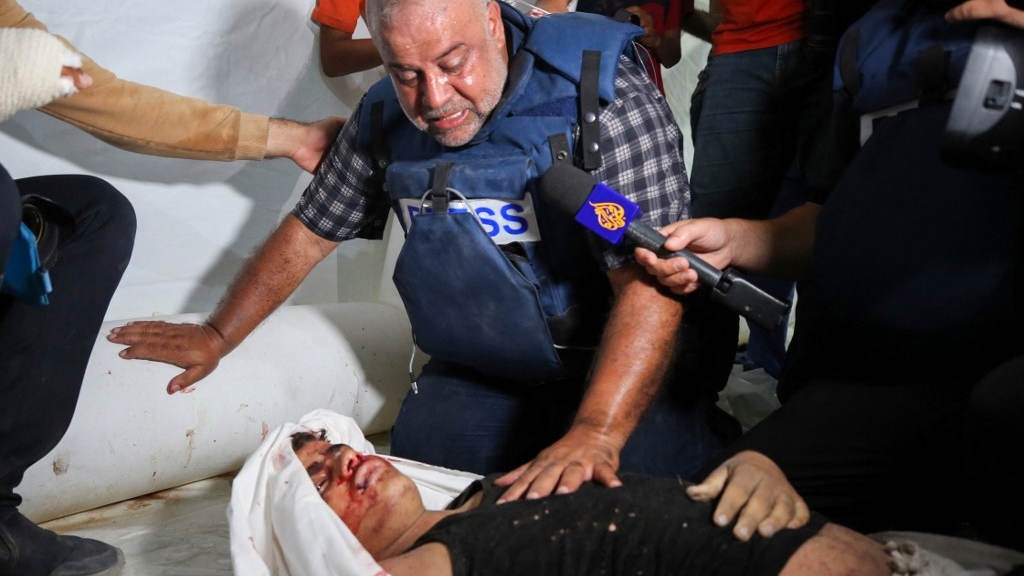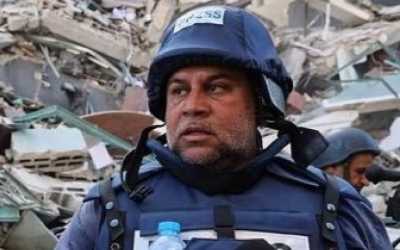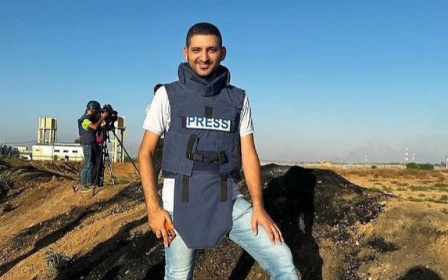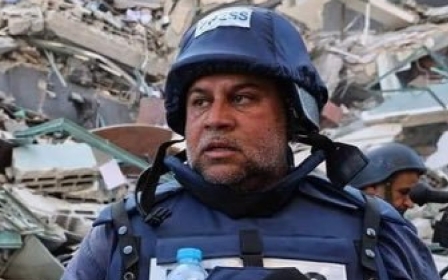Al Jazeera reporter's son dreamed to be a journalist. The Israeli army killed him

Mahmoud al-Dahdouh was proud of his father’s work, and wanted to follow in his footsteps.
The son of Wael al-Dahdouh, Al Jazeera's chief correspondent in Gaza, was inspired by his father’s coverage, which had earned him the title of “the voice of Palestinians in Gaza”.
Mahmoud was in his final year of high school and working hard to become a journalist.
However, the dreams of the teenager were cut short when he was killed on Wednesday evening in an Israeli bombing in Gaza’s Nuseirat refugee camp, which had been designated a safe zone by the Israeli army.
Mahmoud, along with his sister, mother and nephew, were killed despite Wael’s efforts to separate them in case of a bombing, so he wouldn’t lose them all in one go if the worst was to happen - a tactic employed by many Palestinians during times of war.
New MEE newsletter: Jerusalem Dispatch
Sign up to get the latest insights and analysis on Israel-Palestine, alongside Turkey Unpacked and other MEE newsletters
Wael was informed live on air of the loss of his family members during his coverage of air strikes on residential neighbourhoods in Gaza.
Video footage shared online later shows Wael kneeling over his children's bodies in tears, and saying that Israel was “taking revenge by killing children”.
"You wanted to be a journalist," Dahdouh said while kneeling on the floor next to Mahmoud's dead body.
A dream
Often mimicking his father’s sign-off during live broadcasts and accompanying him during days off to help on their land, Mahmoud had often been dubbed “young Wael”' by loved ones.
Since the hostilities started on 7 October, Mahmoud and his sister Sham had started making videos covering Israel’s bombings of Gaza.
In one video, Mahmoud and his sister describe what it’s like living under bombardment.
“For the fifth day, Gaza is living under complete violence and a siege, with electricity, internet, water being cut off and the targeting of safe houses,” he says.
“Whole neighbourhoods have been destroyed, of which there is only rubble and ash left,” his sister adds.
Mahoud was described by an Al Jazeera journalist in Gaza as “a friend of everyone in the bureau; he was close to all of the camera people.”
The journalist explained that Mahmoud always “dreamed and spoke of being a journalist", inspired by his father. "He undertook a great deal of training and courses to help him fulfil his dream," he explained.
“He spoke in English, and posted a range of videos depicting what was going on to try and change the narrative that Israel was giving about Gaza,” he added.
During Wael’s time off, he often spent time with his family, sharing meals and tending to their land.
His wife, Amna, was supportive of Wael’s career, despite the fact that he was often away from home and reporting from the front lines.
“The 2014 war was something different, I was worried about Wael and my son Hamza, I didn’t know who to worry about, there was so much going on,” she said in an Al Jazeera documentary.
Follow Middle East Eye's live coverage for the latest on the Israel-Palestine war
“The worst thing about journalism is that there’s no set routine…I got used to Wael being away at work,” she added, joking that she “did not ask to be on camera, Wael is enough”.
Wael has previously described being targeted for his journalism by Israel.
“We understood the message [from Israel] that it is intentional, they’re saying calm down with the coverage, your work is exposing what is happening, but after minutes we would be on camera outside of our offices describing what is happening, even though we knew that in a matter of seconds we could be the focus of the news,” he said about his coverage of the 2014 war on Gaza.
'A kind person'
Since the killing of his loved ones, tributes have poured in, with many of al-Dahdouh’s colleagues giving their condolences to him live on air.
Tamer al-Mashal, a presenter who worked closely with al-Dahdouh, said it was difficult to report on the killing of his family.
“I am proud to have worked with Wael...he was close to the heart, a friend, a brother. Wael insisted on covering what was happening, and stayed in Gaza despite the threats and the bombs, and made sure to relay what was happening with a sense of responsibility,” he said.
Al-Mashal also described how Wael, in the midst of war, would visit correspondents’ to give his condolences when they lost loved ones and would stay with journalists’ families in the hospital, ensuring their needs were met, before returning to the front lines.
“He is a journalist, but behind that, he is a kind person, from a generous, well known, resilient Palestinian family…during the first Intifada he covered events diligently. He is self built, he is a mountain that does not waver, falter or get weaker, he has stayed in Gaza despite threats,” al-Mashal added.
In a documentary aired on Al Jazeera, Wael previously said that one of the most difficult times in a journalist's life is reporting during conflicts, only to learn some of those killed are family members.
While he originally wanted to study medicine, Wael was arrested arbitrarily by Israeli forces days before a scholarship to Iraq, later inspiring him to undertake journalism as a career.
"While buildings are destroyed, the memories and the voice remains, and we remain steadfast," he said in the documentary, first aired last year.
"The more they want to silence us, the more I want to tell the story, to document the daily lives of people under occupation, and to cover the war, one of which I'm not sure how we survive or how it will end."
At least 24 journalists have been killed in Israeli air strikes since the start of the war on 7 October, which has ravaged large parts of Gaza.
Middle East Eye delivers independent and unrivalled coverage and analysis of the Middle East, North Africa and beyond. To learn more about republishing this content and the associated fees, please fill out this form. More about MEE can be found here.





